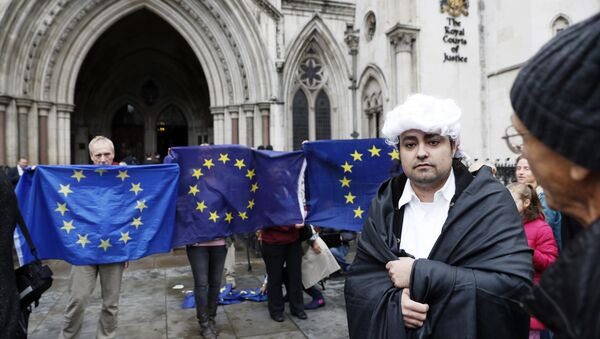The publication said that the German constitution restricts the extradition of the country's citizens. It can be done only when other EU member states apply for extradition via a European arrest warrant or through an international court.
Since 2010, London has filed nearly 1,800 requests for extradition using European arrest warrants, including 15 requests for the extradition of German citizens in connection with money laundering, drug trafficking and other crimes. In addition, the German Interior Ministry said in January that UK citizens living in Germany would be given three months to receive long-term residence permits in order to stay in the country.
Radio Sputnik spoke about Germany's plan to cancel extradition arrangements with the United Kingdom after Brexit with Aidan Flynn, an expert in Constitutional Law, European Union Law, Human Rights Law and lecturer at the School of Law, Policing and Forensics at Staffordshire University in the UK.
Sputnik: In your opinion, how likely are other countries of the European Union to follow Germany's footsteps now in prohibiting the extradition of its citizens to the UK after Brexit?
Aidan Flynn: It is difficult to say, but I would think that it is not very likely that many will follow Germany's lead on this. In the first instance, if there were to be an agreed deal which formed a treaty between the EU and the UK, later this month or next month, then that would be governed in part at least by European Union law, and Germany as a still-subsisting member-state would be bound by that EU law under the principle of the supremacy of EU law, a principle that Germany well knows, having indeed lost some cases at the EU's Court of Justice in Luxemburg.
READ MORE: Brexit Latest: UK Crash Out Most Likely, as Irish-EU Solidarity Bond Unbreakable
The supremacy principle of EU law takes priority even over German constitutional law.
Sputnik: It's a very interesting decision by Germany and I am a bit surprised by it myself. What can you actually say about this particular German decision? What is the rationale?
Aidan Flynn: It is not something that falls easily within my expertise, but I would like to just pass brief comment on it because I think that, perhaps, the bigger political picture needs to be borne in mind. This is not an announcement, this is not an approach or a decision from Germany and from its authorities that is taking place in isolation. We have to look at the very huge state of flux that there is in terms of UK-EU relations.
So I think that political issues and political considerations, although it is not in the area of my expertise and I just focus on law, I do think that on this occasion it is not wise to turn one's back on that political backdrop, which I think does have some part to play in decision-making, even on law matters at the moment.
Sputnik: Well, thank you for that aide and now will the UK be able to extradite citizens from other European countries after Brexit?
Aidan Flynn: If there is an agreed arrangement between the European Union and the UK then all sorts of matters would be covered comprehensively and no doubt there would be continuing arrangements, either transitional or longer-term arrangements, to facilitate this smooth flow of people back under something, hopefully, not too much more awkward than the very slick process that already exists.
The advantage of the European arrest warrant as it stands is that it is much more straightforward than the types of bilateral extradition arrangements that preceded it. So, if there is a deal, then European Union law would govern that deal and its contents, including its contents on extradition.
That would mean that the contents on extradition had a great deal of clot and power behind them under the supremacy principle, the principle of the supremacy of EU law.
Sometimes (they're) very serious crimes against fellow people, not just these financial crimes but some serious violent crimes, and sexual violence crimes. It is in these other member states' own interests, whether there is a deal between the UK and the EU or not, to try and facilitate some process.
So I think that apart from this story we hear today in relation to Germany, the arrangements will by and large continue in some ad hoc fashion, either in the short or medium-term, and then reach a point where there is a continuing good level of cooperation.
READ MORE: UK Lawmakers Reject Amendment Calling on Gov't to Delay Brexit
Whether there is a deal or not, I think this can be worked out to the satisfaction of justice authorities.
Sputnik: Well, it is certainly a surprising one and given the complexities of the European Union and Brexit that you are alluding to, I can imagine that some of these criminals are going to be hauling their way across the British Channel to Germany; but anyway, we will see what happens in the future. Brexit is got to be delivered first, of course. What are the consequences that Brexit could have for the country's law enforcement and the European Union's law enforcement? I mean, there are so many facets of this Brexit event that many, many people did not even take into consideration. Security is obviously, one of the important ones that wasn't really one that we focused on when we were debating a couple of years ago. What are the consequences for the country's law enforcement under the European Union's law enforcement then?
Aidan Flynn: Yes. Now it is interesting that today we hear this new story which focuses on persons.
The European Union is built on four fundamental free movement principles. The free movement of persons and the free movement of goods are two of the four important free movement principles that underpin the European Union and its single market.
However, there are very great concerns, and earlier this year, the commission of the biggest police force in the UK, the Commission of the Metropolitan Police in London, did set out her concerns.
I think the point is this really and it is a big point that applies to goods and persons that anyone, however expert they may be, who tells you that it is possible to foresee all the little loopholes and all the little snags and all the little unforeseen issues that crop up in the coming months and years is not really being honest and truthful.
It will be impossible after around forty years of membership of the European Union for there to be a situation where no snags of any consequence or any note raise their heads.
The views and opinions expressed by the speaker do not necessarily reflect those of Sputnik.






